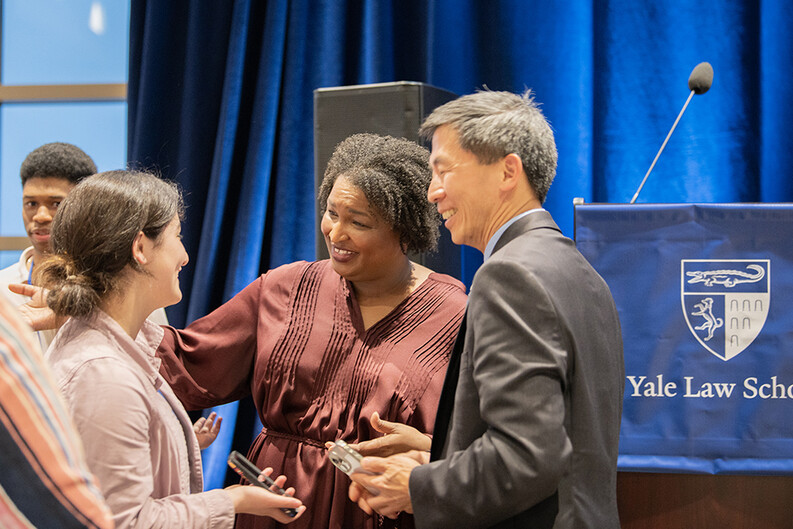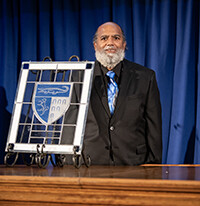First Diversity Homecoming Celebrates Experiences of Alumni of Color

More than 250 alumni returned to campus for the inaugural Diversity Homecoming at Yale Law School on April 14–15. The two-day gathering, the first in a series of ongoing events in New Haven and around the country, focused on the experiences of alumni of color. The weekend included a variety of panel discussions with alumni and faculty, a luncheon to honor Associate Dean Mike Thompson’s three decades of service to Yale Law School, and a speech by Stacey Abrams ’99 at a dinner honoring her advocacy on voting rights and commitment to public service.
In front of a packed auditorium on Saturday, Dean Heather K. Gerken provided a State of the School address, highlighting the substantial progress Yale Law School has made in diversifying the student body and faculty. Gerken also detailed the work that has gone into building a robust infrastructure to support students — particularly those from low-income backgrounds — while in law school and as they launch their careers.
“When I speak of the State of the School today, I’m deeply — and gratefully — aware that every change, every improvement, every triumph was pushed forward by you and the generations of students, faculty, and staff of color who stood beside you,” said Gerken.
Together with Sterling Professor of International Law Harold Hongju Koh, Gerken paid tribute to Associate Dean Mike Thompson for his years of service to the Law School, which brought the audience to its feet four times in recognition of his contributions. A stained-glass law school shield was presented to Thompson, and it was revealed that his portrait had been commissioned and will hang in the Sterling Law Building.

“Mike has been our guardian angel,” said Gerken. “His love for this Law School is palpable, as is his love for the members of this community. Generations of students, many of whom are in this very room, would not have made it through the law school without him.”
The first panel discussion of the weekend, Advancing Racial Justice, was moderated by James Forman Jr. ’92, the J. Skelly Wright Professor of Law at Yale Law School, and featured Deborah N. Archer ’96, Associate Dean and Professor of Clinical Law at NYU School of Law, and Gerald Torres ’77, Professor of Environmental Justice at the Yale School of the Environment and Professor of Law at Yale Law School. The panelists reflected on the progress made in the diversity of the current classes compared to their time at the school.
“My wife and I host a gathering every year in the fall of the incoming Black law students at our house, and our first few years were like the years when I was a student. Some lovely, wonderful people came in. They were amazing, they were brilliant, they were talented, and they all fit in our living room,” said Forman. “We just did our event this past fall, and the door opened up and people were streaming in. There were so many people pouring into our house that we had to use [every available space].”
Archer emphasized the need for long-term strategies to address racial justice, stating “our plans are measured in centuries.” Torres stressed that while the current cultural wars may seem overwhelming, the baseline is changing, and each obstacle doesn’t send us back to the starting point.
Monica Bell ’08, Professor of Law at Yale Law School, moderated a panel on Creating a Sense of Belonging. Bradford Berry ’88, Digital Equity and Inclusion of the Federal Communications Commission; Lovely Dhillon ’90, CEO and founder of JODEVI Consulting; and Taonga Leslie ’19, Director of Policy and Program for Racial Justice at the American Constitution Society, discussed their experiences and ideas for promoting diversity, equity, inclusion, and belonging in their respective fields. The panelists engaged audience members during the interactive session, and Berry urged everyone to understand that the work is hard but immensely rewarding.
In an afternoon panel discussion, guests reassembled in Levinson Auditorium for the Future of Education panel, which tackled issues surrounding affirmative action, student debt relief, and the pandemic’s effects on educational outcomes. Led by Goodwin Liu ’98, Associate Justice of the California Supreme Court, the panelists Richard Buery Jr. ’97, CEO of Robin Hood; Margareth Etienne ’95, Carl L. Vacketta Professor of Law at the University of Illinois Urbana-Champaign College of Law; and Henry Fernandez ’94, Executive Director of LEAP, also discussed the tough choices that need to be made as a country to address these issues and used the December 2022 expiration of the Child Tax Credit — which had reduced the number of children below the poverty level in half — as an example of such a decision.
“There is a long-term pathway toward fighting for fundamental change and how we approach educational decision-making,” said Buery. He later added, “We are fighting the fights today so that hopefully our children and grandchildren don’t have to fight the same fights.”
To cap off the afternoon, Dwayne Betts ’16 read from his book Redaction, co-written with Titus Kaphar ’06 MFA. The book presents a literary and artistic collaboration that confronts criminal justice system abuses. During the event, Betts also discussed his project Freedom Reads, which aims to place millions of books into prisons, one 500-book Freedom Library at a time. “I realized what I wanted to do was change the landscape of prison by having people show up in prison,” Betts said. “We put millions of people in prisons. What if we put millions of books in prison?”
The Diversity Homecoming weekend concluded with a dinner at the Boathouse, where Abrams delivered an impassioned keynote address to an at-capacity crowd. Abrams’ portrait, commissioned by Yale Law School professor emeritus Michael Graetz and Columbia professor emerita Brett Dignam, was unveiled at the event, and will hang in the Sterling Law Building.
In her address, Abrams talked about her journey to Yale Law School. Though daunted by the cost, she said: “The opportunity to attend the preeminent law school in the nation was not going to be thwarted by my absolute inability to afford it.” As she found her path through law school, she connected with other students of color. “Diversity was not a motto; it was a battle cry,” she said. Abrams concluded by enumerating three lessons: Remember who you are, remember whose you are, and remember that the goal is progress not perfection.
“Power is most effective when it is shared not when it is hoarded. Opportunity is more vibrant when others can access it,” she stated.


